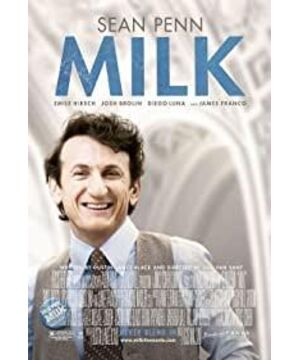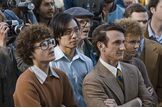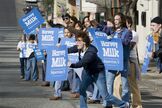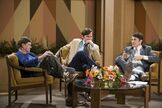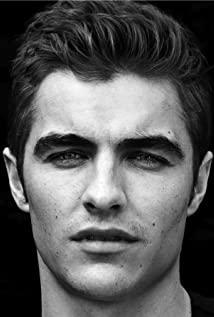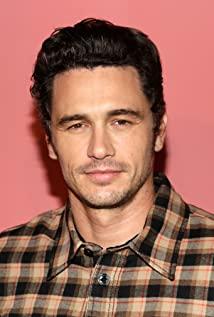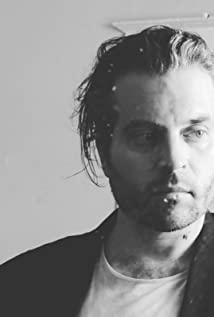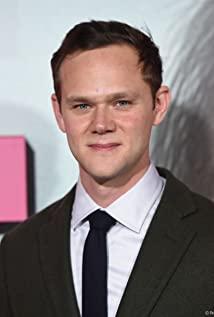Although there are many movie reviews on the Internet, although I haven't gotten rid of the mood after midnight, and although there are still many things that are still in the future, I still want to write down something.
Directed by Gus Van Sant, this film focuses on the best decade of America's first openly open congressman, Harvey Milk (1930-1978), and one of the most exciting in the history of the gay movement in America. Regardless of the casting or the content of the story, they are as close to the truth as possible. The director's rhythm is lively and the narrative is organized. Juicy text.
"I need to change. I'm forty and I haven't done a thing I'm proud of," Milk says at the beginning of the film. In fact, Milk himself has always been a person who did a good job but was not satisfied with the established life. He also lived in Texas before wandering all the way from New York to Castro Street in California. The United States in the 1960s and 1970s was an era of high pressure on comrades. In the film, the police arrested and beat comrades wantonly in gay bars. Comrades often had to carry whistle to protect themselves and help each other, not to mention that oral sex was still a crime, and they were found to be gay of people would be evicted by their landlords, so many comrades sought solace in the parks and the streets.
In the 1970s, Eureka Valley in San Francisco was located near the junction of Market Street and Castro Street. It had a unique urban ecology. Most of the nearby residents were Irish Catholics and blue-collar workers. Later, policy relations began to attract the Roman Catholic middle class. Many gay soldiers who were forcibly discharged from the Navy also chose to stay away from their hometown and stay in this harbor city (escape from their hometown and going to a big city is also one of the life courses that many gays have no choice). Gradually, Castro St. became a gay community. Harvey chose to live here with his other half, Scott, who was 18 years younger, and opened a photo studio. At that time, in order to protest the American invasion of Cambodia, they all had long ponytails, long beards, and lived a free and romantic lifestyle.
It can be said that the anti-Vietnam War, the hippies, and the reaction to the middle-class way of life were surging in the United States throughout the 1970s, all of which nurtured the energy of the gay movement under high pressure. Even in the gay gathering area, Castro St., regardless of the light and dark, the endless violence and threats against gays, finally made Harvey decide to start from the street and register to run for election. He has always had a group of good friends and military divisions based in the living room of the photo studio. .
Vulnerable groups have a hard time in most violent democracies. The accumulation of countless failures, and finally the strong unity and mobilization of comrades under slightly favorable rules of the game, Harvey finally became the first openly gay congressman in American history. This political path can be said to have quite truly portrayed the mode of American politics: on the one hand, Harvey has a very practical policy mind, promoting and winning the votes of certain ethnic groups such as the elderly, blue-collars, comrades, etc.; Actively striving for propaganda effects and forming public opinion pressure is like his insistence on the purpose of running for election in the early years: failure is not important, the focus is on the appearance and expression of comrades.
In addition, during the debate, Harvey's speech was very flexible and clear. He once said: As a gay MP, every anti-discrimination and rights-defying bill is not just an issue for him or just paving the way for a political career. . He had four relationships in his life, the first three nearly committed suicide because he dared not come out of the closet. To him, being a gay MP is more like a struggle and struggle in life.
At that time, the conservative forces led by religion and the middle class were very powerful. They proposed to fire teachers with gay tendencies and straight gays to prevent children from being "contaminated" (here Harvey refutes why he is not "contaminated" by heterosexuality. ”, brilliant!); and also against the equal rights bill for gays in the workplace. Many issues such as the right to work, the right to life, etc., seem to be very laughable now. However, not long ago, the passage of the Eighth Act in the United States, the veto of gay marriage, and conservative groups such as religion once again focused on faith and family. The strong mobilization and opposition of value-based demands is fundamentally the same as the scene of the year.
However, in the context of the American environment, it is precisely because of high-pressure violence and personal suffering that they unite to resist and fight on the streets and within the system, defending and fighting for their rights and interests step by step. And that's what Harvey stands out for: He's broken the long-standing comradeship of oppression in exchange for cooperating with right-wing politicians, just for a little bit of security. He encouraged everyone to stand up and have the courage to come out of the closet, so that everyone can see the real gay face in life, so as to gain empathy and understanding, and at the same time, let the gay community itself see companions and hope.
Here, too, can be seen the merits of American democracy. As a system, although it is not a recipe that works well everywhere, and each country has its own historical and social problems, at least in the United States, it ensures that there is a sense of pride in the country's constitutional tradition. Faith also allows individuals to use different channels such as law, politics, media, and streets, and the balance and conflict of forces, so that worldly values and rationality can be brought into play. The value and significance of personal struggle has always been the United States, a country that prides itself on being a liberal, and it is most appreciated and encouraged to carry forward to the extreme, and we can also see that a prominent individual hero, and when each individual can act consciously and introspectively. , the social effect brought by it is huge.
Of course, the heights are very cold, and as a hero Harvey also has his own sacrifices and sacrifices, whether it is personal feelings, or is often exposed to the danger of being assassinated. But perhaps when he moved to Castro St., ready to transform and make a difference, he was determined to dedicate his life and life to doing the best he could for this community.
In short, after watching this movie, there are so many feelings that are unspeakable and deeply throbbing in my heart. On the one hand, the United States is the outpost of the gay movement. Compared with the gay movement in Asia, different national conditions, time and space will have different strategies to deal with, although the ultimate goal of equal rights is the same. In this regard, the gay movement in Asia still has a lot of homework to do. Besides, since Harvey can start such a brave and rich life after the age of forty, it seems that we do not need to stuff our life into a pale and uninteresting formula too soon; some seeds are sown in the heart, so why not wait A little years of watering.
Like I used to say, we all end up going where we are in our hearts, no matter what, stick to what you love and feel, truly and deeply in the heart.
※Extended reading: This movie won the best award at the Oscars Adapted screenplay Dustin Lance Black and actor Sean Penn's acceptance speech (English text and video; Chinese translation).
※Marvin Gaye, What's Going On, in "Motown's Greatest Hits". Originally released in "What's Going On", 1971.
Since I read the report of Leixuan's visit to Fang Datong, I have recently become obsessed with Marvin Gaye's music. "What's Going On" is a classic album that he started as a producer after ten years in the industry, and he began to speak and sing his own words freely. On this album, Marvin Gaye touched on many serious issues that were lacking in soul music at the time: the decline of the urban economy, the aggression of military operations, police violence, unemployment and poverty, and so on. The most classic lyrics in it are: "Only love can conquer hatred, let's find a new way to bring love here." I hope we can all accomplish more with such a belief.
Mother, mother
There's too many of you crying
Brother, brother, brother
There's far too many of you dying
You know we've got to find a way
To bring some lovin'
We don't need to escalate
You see, war is not the answer
For only love can conquer hate
You know we've got to find a way
To bring some lovin' here today
Picket lines and picket signs
Don't punish me with brutality
Talk to me, so you can see
Oh, what's going on
What's going on
Ya, what's going on
Ah, what's going on
In the mean time
Right on, baby
Right on
Right on
Father, father, everybody thinks we're wrong
Oh, but who are they to judge us
Simply because our hair is long
Oh, you know we've got to find a way
To bring some understanding here today
Oh
Picket lines and picket signs
Don't punish me with brutality
Talk to me
So you can see
What's going on
Ya, what's going on
Tell me what's going on
I'll tell you what's going on - Uh
Right on baby
Right on baby
View more about Milk reviews


